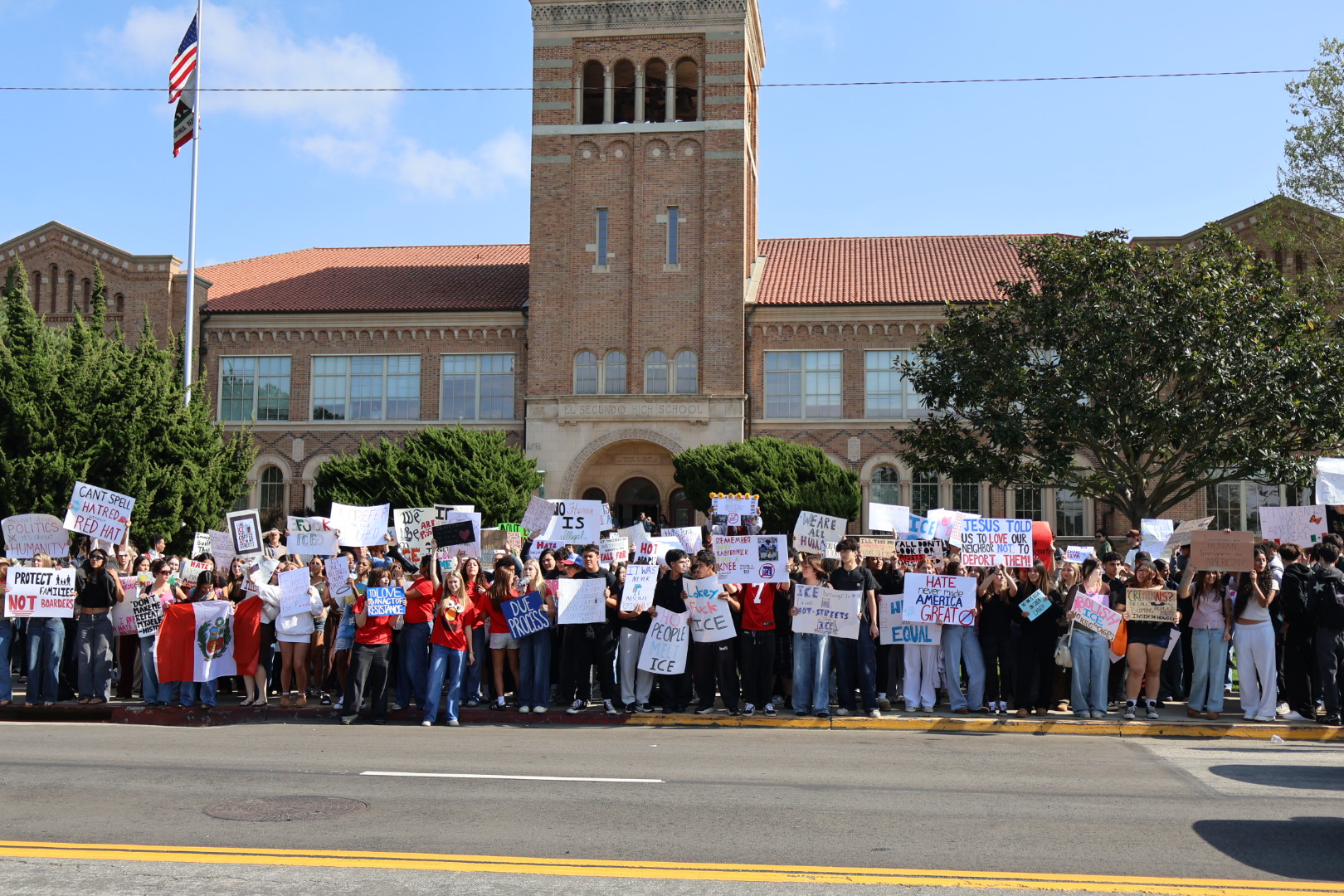
Randy Fujisaki is one of Hermosa Beach’s parking enforcement officers who drives around town chalking tires and issuing warnings and tickets. He’s been spit on and hollered at.
You have to treat people professionally and not take it personally, Fujisaki said. He knows some people don’t even realize they parked in the red, for example.
Fujisaki is one of nine community service officers, otherwise known as the parking enforcement department. It’s this department that the City Council next week will consider disbanding in favor of paying a private company to step in as a replacement.
If it happens and Fujisaki finds himself without a job, he’ll be okay. “I’ll get another job. People get new jobs all the time,” he said.
But he hopes to stay just where he is. He thinks the department, which is not privatized, does a good job and does a lot more than just issue tickets.
The day starts at 6 a.m. for the first shift. They check to see if any animals were dropped off in the kennel overnight. The parking enforcement division is also the city’s animal control department, and sometimes a police officer working the graveyard shift will put a stray dog in the kennel. Until midnight, calls for stray animals go to them, too. Last year, they received 1,093 animal control-related calls, according to police statistics.
At 6:30 a.m., they ticket and have cars towed on Pacific Coast Highway so the extra lane is clear during rush hour.
The street sweepers begin their rounds at 8 a.m.
Ideally, parking officers drive in front of the Athens street sweepers, but that doesn’t always happen, especially if there are a lot of cars parked illegally on PCH.
During the school year, parking enforcement officers fill in for absent crossing guards. They also take down signs tacked to telephone polls, unless it’s a missing animal sign in which case they leave it up for a week.
When there’s a missing child at the beach, all community service officers on duty stop what they are doing and respond until the child is found.
In all, community services officers have 126 duties, from removing road-kill to monitoring the taxi zones to checking construction permits.
“We do a lot of things people don’t realize,” said Sean Tanabe, one of the two field supervisors.
On Monday mornings, Tanabe can often be found clearing jammed parking meters along Hermosa Avenue near 22nd

Street. A lot of weekend beach traffic funnels off Artesia, and the meters in the area get a work out. Sometimes dimes dropped into the meters block the mechanism and prevent parking time purchased from registering on the meter.
The city is expected to install a section of parking meters that accept credit cards, although when and where that will happen hasn’t been determined yet.
Private possibilities
As local governments look to raise revenue and reduce pension obligations, privatizing public agencies is catching on as a trend, especially parking meter duties. Chicago, Indianapolis and Atlanta have turned to private companies— and the move remains controversial in some places, such as Chicago. Other cities, including New York, Sacramento and Pittsburgh, are considering private parking contractors.
When Mayor Pro Tem Kit Bobko, a vocal proponent of reducing the city’s pension expenditures, proposed outsourcing the parking enforcement division earlier this summer, the move was met with resistance from some city council members. Bobko believes there’s a reluctance to take on public unions. He said his proposal is simply to issue what’s called a request for proposals.
“After we go out and ask people who are in the private sector what they can do and how much it will cost and what the benefits are – after we have done that due diligence — if it turns out that it just doesn’t make sense, then so be it. We’ll stick with what we’ve got,” Bobko said. “But we’re not even willing to do that. Normally, you don’t ask the question when you are afraid what the answer will be. And this seems to me to be a situation where we don’t even want to know.”
When Bobko presented his proposal for outsourcing the parking enforcement division in June, he included a list of salaries and benefits earned by the city’s community services officers for the fiscal year 2011-12. Four of the positions listed are no longer paid under the city’s original retirement system, but rather the “two tier” retirement system implemented for city employees last year to reduce city expenditures.
Additional belt-tightening by the community services department has come by way of eliminating seasonal help. Until this year, the department had two extra people work the summer. A key provision of Bobko’s outsourcing proposal would be to require any company that takes over parking meter duties to offer jobs to those city workers that would be replaced.
“I bear no malice or ill will toward anybody who works for the city,” Bobko said. “They’re all hard working folks. I appreciate what they do. I think it’s important to the city that they do it well. But gosh, I just don’t see how we can continue to pay them fifty percent more than the job would normally earn in the private sector.”
Bobko said outsourcing the city’s parking enforcement division would reduce the city’s pension and healthcare obligations, increase city revenue and address accountability issues in the department identified by City Treasurer David Cohn.
Cohn in May called for an overhaul of the parking meter system, saying that 158 of the city’s 1,671 meters were not functioning properly, $2 million a year in revenue is not properly audited, and there is “an unusually large backlog of disputed parking tickets.”
The backlog of parking tickets is related to equipment issues with Duncan Solutions, Inc. of Milwaukee, Wisconsin, which supplied the pay stations at the parking structure and plaza parking lots. Some of those issues are still not resolved, said Ennis Jackson, community services administrative coordinator.
Jackson said that parking officers can use hand-held ticket writers to see which spaces at the parking structure or at the downtown parking lots are expired, but they can’t write tickets with them yet.
“We have not yet gone online with Duncan’s system. That’s still in the works,” Jackson said. “They’ve been working at bringing over their information and transporting our information into their system.”

Jackson said the 158 meters identified by Cohn were producing revenue.
“I have the records to show those meters were taking in money during that particular quarter,” Jackson said. “We just happened to have a glitch with our handheld system that audits those meters, and it just didn’t audit those meters. But because I know that, I always jot the numbers down and store them in my phone and then make a supplement to the meter audit to show that those meters were actually working.”
Treasurer’s findings
Cohn acknowledged that many of his concerns over the collection practices and auditing of the parking meters have been satisfied since issuing his report May 1, which Cohn said was never meant to promote outsourcing the community services division. In a letter to the City Council attached to next week’s council agenda, Cohn said 90 percent of the problems identified in his May 1 report could be solved by aggressively installing credit card-accepting meters, as other cities have done.
Cohn said that Hermosa Beach could easily take advantage of the self-financing alternatives offered by parking meter manufacturers, so that general fund money isn’t needed. “It is a fact that every parking system which has installed credit card meters has improved efficiency,” Cohn said in his letter to the City Council.
Cohn estimated that credit card meters in Hermosa Beach could potentially increase annual revenue by at least $350,000, especially if the city remotely adjusted meter rates as Manhattan Beach does, Cohn said.
“If we should go to outsourcing the collection of parking meter funds, my department will be asking for $25,000 to $30,000 in next year’s budget for auditing these services,” wrote Cohn, adding that the pay scale for the city’s community service officers is very close to neighboring beach cities.
“We also should be prepared for a sharp increase in citation disputes, which most cities experience when they outsource that particular function,” Cohn wrote.
Newport news
When cities turn to private companies for parking meter duties, city officials often cite upgrading equipment as a key reason to make the move. Private companies pay for new meters. The city doesn’t have to shell out a major capital expense this way. A typical arrangement is the city paying a monthly fee, including both principle and interest, for the length of a contract with its parking contractor. Such was the case in Newport Beach.
When Bobko made the proposal to outsource the parking enforcement department in June, he cited Newport Beach as a city that compares well to Hermosa Beach. They are both dense coastal cities that attract many visitors on the weekends and during the summer. Newport Beach outsourced its parking meter enforcement duties in April 2011 and reaped the benefits, including more city revenue and less retirement obligations as a result, Bobko said.
Evelyn Tseng, the revenue manager with Newport Beach, said that since outsourcing the city’s parking meter collection and enforcement in April 2011 to Central Parking System of Nashville, TN, revenue from parking meters increased 24.4 percent over the previous year, including salary and benefits savings of about $500,000.
CPS receives a bonus if the city meets certain revenue goals at the parking meters, Tseng said. Although CPS wrote 26 percent more tickets than city workers did the previous year, Tseng said that CPS receives no money for issuing citations.
“So it’s actually better for them (CPS) to encourage people to feed the meter as opposed to writing a citation,” Tseng said.
One part-time and three full-time positions in the finance department were eliminated, and three vacant police department parking enforcement positions went unfilled, Newport Beach officials said. When CPS took over, the company interviewed the city staff it was replacing and offered them jobs but none accepted, Tseng said.
A spokesman for Central Parking System did not respond to requests for comment.
The parking enforcement division in the Newport Police Department continues to enforce parking laws unrelated to the parking meters, including red zone violations and two-hour parking zones as well as other duties.
Newport Beach has 2,675 parking meters in the city, and when CPS took over, the company switched 1,300 single-space and seven multi-space mechanical coin-operated meters to electronic credit card-accepting meters. Meters where the revenue rate was too low were left as coin-operated.
“This group (CPS) is more efficient in collecting the revenue,” Tseng said. “We had fewer down meters. When meters were broken, our previous staff was pretty good about getting out there to fix them. But the parking contractor is much faster.”
“The conventional wisdom in the industry is that when people pay on a credit card-accepting meter, they usually pay more than what they can scrounge out from their pocket or their ash tray looking for quarters,” Tseng said. “They usually put in $5 instead of a $1.25 when they are going to the store.”
The new credit card-accepting meters were manufactured by IPS of San Diego. Tseng said that CPS entered into a lease agreement with IPS for the new credit card-accepting meters, and Newport Beach was paying CPS monthly as part of their contract.
The contract stated that Newport Beach would own the meters when the parking meter lease agreement between CPS and IPS was paid off in five years. However, just a year into the lease, Newport Beach city officials in May decided to purchase the meters for $819,000 because it made economic sense, Tseng said.
“We realized we could actually save a lot more money if we bought the meters outright,” Tseng said. “That was a critical change that required an investment on our part.”
IPS also sells and installs new technology meters directly to cities throughout the country, including to Manhattan Beach, which has more than 600 new technology street parking meters throughout the city.
“One of the benefits of going from a mechanical meter to an electronic meter is that they can tell when it’s down or when it’s full with coins. They’ll actually get a list of meters that need maintenance,” Tseng said. “So far, it has been a positive move for the city to outsource this particular service. The council has been generally pleased with it.”
Newport Beach raised parking meter rates in April, 2010, a year before outsourcing, charging an extra 50 cents per hour across the board, Tseng said. The parking meter contractor is not allowed to raise rates without city approval.
Tseng said the number of complaints from residents hasn’t significantly changed since CPS began its parking meter collection and enforcement in Newport Beach, just the type of complaints. Before, drivers might complain that their coin got stuck and they received a ticket at a broken meter. Now, the city receives complaints that the meter didn’t read the credit card and they didn’t get credit for paying.
The Hermosa Beach City Council vote next Tuesday, Sept. 11, on whether to pursue outsourcing the parking meter division after a public hearing. The meeting begins at 7 p.m.
The following is revenue generated by parking citations as well as parking meters in the city of Hermosa Beach, according to the city’s finance department, as reported in a sidebar in the 9-6-12 newspaper edition:
Revenue generated by parking citations:
2005: $917,943
2006: $1,320,294
2007: $1,285,343
2008: $1,622,597
2009: $1,740,738
2010: $1,821,943
2011: $1,956,290
Revenue generated by parking meters:
2005: $1,474,976
2006: $1,489,648
2007: $1,486,393
2008: $1,564,402
2009: $1,594,658
2010: $1,717,007







